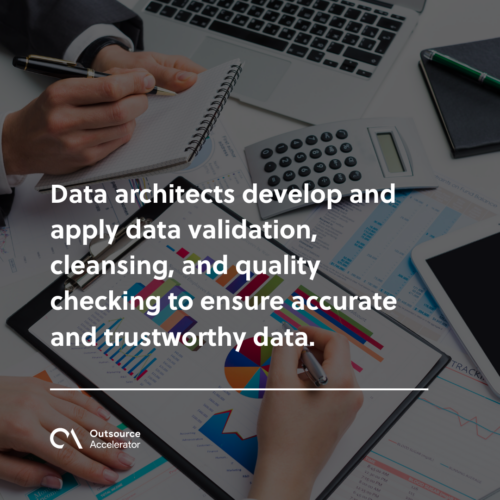Data Architect 101: Roles, key responsibilities, and skills

Organizations are creating and collecting more data than ever in today’s data-driven society. This information may be used to gain insight into consumer behavior, market trends, and business performance.
However, organizing and evaluating this data may be complicated. This is when a data architect is needed.
A data architect is responsible for conceiving, designing, and maintaining an organization’s data architecture.
Understanding the necessary tasks, responsibilities, and abilities of the role guarantees businesses they have the expertise to manage their data. Plus, they have the capacity to make smarter decisions.
This article explains a data architect’s essential responsibilities, including the skills firms should look for when employing one.
What is a data architect?
To become a data architect, one must be a strategic thinker. A data architect formulates data principles and standards and translates business needs into technical specifications.
The data management framework of a company is the responsibility of the data architect. This means that a data architect is the one who is liable for conceptualizing and developing that framework.

Data management is carried out by the following specific sets of information within a data infrastructure:
- Plan
- Specify
- Enable
- Generate
- Acquire
- Manage
- Utilize
- Archive
- Retrieve
- Control
- Delete
In addition, the data architect is responsible for establishing a standard shared business language and articulating strategic needs.
People often confuse this job with database administration and data engineer jobs. However, a data architect focuses on business intelligence connections, data systems, data modeling, and data policies.
Roles of data architects in business success
Here are some of the integral data architect responsibilities that are critical in achieving business success.
For firms opting to hire for this position, data architect job descriptions encompass the following:
Support data-driven decision-making
Businesses rely heavily on these specialists because of their crucial role in supporting data-driven decision-making.
Data architects collaborate with stakeholders to identify the most crucial metrics and data sources. They then design and implement the requisite data architecture to facilitate analysis and reporting.
In addition, data architects aid in making sound decisions by providing decision-makers with accurate and up-to-date information.
Ensure data quality and consistency
Any business that wishes to base its choices on accurate information must prioritize data quality and consistency. A data architect’s work is essential to maintaining reliable and timely information systems.
Data architects develop and apply data validation, cleansing, and quality checking to ensure accurate and trustworthy data.
These specialists also create and implement data governance policies to guarantee reliable and consistent data management.

Facilitate scalability and future growth
With the help of a data architect, businesses may expand and adapt to new trends and growth opportunities as they arise.
Data architects put in the effort to make sure that data structures can grow and match the business records and the demands of its users.
They also advise businesses to be competitive and create data structures that can be easily modified as needed and will continue to be helpful.
Data architects consult with clients to determine their current and future data requirements, then construct databases to meet those specifications.
They assess new technologies and solutions to enhance data quality, scalability, and governance and make adoption suggestions accordingly.
Key responsibilities of a data architect
“Role” and “responsibility” are sometimes used interchangeably, but they refer to separate facets of an individual’s employment.
Roles are the overall responsibilities and duties of a specific employment or occupation. On the other hand, responsibilities are an employee’s expected behaviors or actions during their work.
As such, here are the key responsibilities of a data architect:
Data modeling
A data architect is in charge of creating data models and designs. Here are the following examples of data modeling that a database administrators could create:
- Entity-relationship diagrams – show the relationship between “entities,” whether those “entities” be people, places, things, or ideas, in a visual format
- Dimensional models – models for building systems in decision support databases such as data warehouses.
- Data flow diagrams – a structured systems analysis and design method component that demonstrates how data moves through a system.
Data management and integration
This involves collecting and organizing various data sources logically within the data management systems. A data architect ensures that all data are correctly transformed, cleansed, and validated.
Data architects are responsible for the design, implementation, and maintenance of database systems. Part of their primary responsibilities are to:
- Choose the appropriate database technologies
- Design database schemas
- Ensure that databases are optimized for performance and scalability
Data governance and security
Data architects are responsible for safeguarding the organization’s data storage. They raise awareness of the legal conditions and implement policies in the firm.
Moreover, a data architect helps businesses save costs by ensuring they don’t incur fines for security lapses or other regulatory violations.
Data science
Data architects also work with data scientists and data engineers to perform data science. They are in charge of designing, implementing, and maintaining the data infrastructure that supports data analysis and modeling.
Required skills for a data architect
Here are the following skills you should look for in hiring a proficient and effective data architect:
Technical proficiency
A data architect must have a solid technical background in using database management system software for efficient data architecture. Familiarity with SQL and data warehousing tools is highly desirable in this role.

Analytical and problem-solving skills
A data architect needs analytical skills to examine complicated databases and mark areas for optimization.
Analytical and problem-solving skills are must-haves for a data architect, who must be able to identify data trends and patterns and leverage them to help a business make smart decisions.
Communication and collaboration
As noted earlier, a data architect often carries out plans and ideas about the company’s strategic needs. As such, data architects must have interpersonal skills and be team players with excellent social and communicative abilities.
Data architect: Key driver in business success
Any business that uses data to make strategic choices must have a data architect on board. Data architects aid businesses in drawing valid and reliable conclusions from their data by assuring its appropriate management, security, and governance.
Further, with an exceptional data architect, businesses can quickly adapt to the ever-shifting business landscape.







 Independent
Independent




